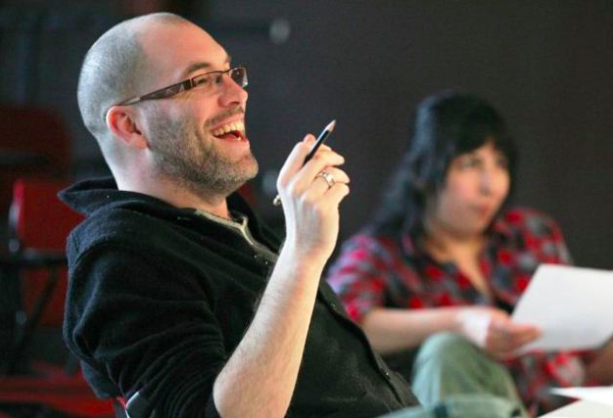Jeremy Cohen - The Playwrights' Center
/This is Minnesota, and today it’s snowing to beat the band. Beauty is all around, the spectacle, sweeping. Take a minute to notice details: there are footprints here and there, tiny and undaunted; eventually, a wide path through the snow. Who is first to make those tracks? How soon do others join in, and how many follow?
Jeremy Cohen is a path maker. He runs the Playwrights’ Center in Minneapolis (PWC) and he champions live theater storytellers in their work. In service to those writers, Jeremy is all action: he marshals, invites, convenes, fosters, adjudicates, challenges, consoles, and catalyzes the contemplative and creative. His Playwrights’ Center cuts a path through the business and distractions of craft, enabling writers to innovate, connect with community, self-advocate, and initiate great theater.
Before the Playwrights’ Center, we can imagine that playwriting in the Midwest was like walking in the snow uphill, both there and back. For writers of color, women, trans artists, the theater world has never been easy or clear cut. Jeremy thinks differently, “We support the changing face of the American Theater,” he avows. Studying theater in his younger years, Jeremy didn’t see himself in most published and taught works. “We were reading Chekov,” he says, “but we are not IN Chekov. I say, ‘Let’s write our own stories.’”
That desire is rife with challenges, both financial and cultural, and can deter even the most devoted writer. “Ours is an artist service organization,” Jeremy explains, “not a producing organization.” Money for produced theater comes (if it comes) at the end, in box office receipts, not at the beginning when a writer is gestating the initial sweep of story. Once that story is imagined and written down, then what? Who nurtures that process? Who pays a writer to keep writing? Who provides feedback so that a written piece might iterate, evolve, and fully form?
PWC in Minneapolis – a nonprofit, part of only a small cohort of similar centers in Chicago, New York, LA – is an entity that encourages a complete writerly process. PWC fellowships to playwrights include financial support, access to talent and workshop space, and technical and professional connection. Jeremy sums up the need: “Writers are the only professionals in the room who don’t have a union representing them,” he says. Without the storytellers, how do we know others, ourselves, or our world? “I tell writers: ‘You give us what we need. You deserve to do what you love. You deserve to be paid. You deserve to be honored.’”
PWC’s largesse (sponsored through foundation grants, artist memberships, fees for classes and space rental, and individual donors) is generous, and almost unheard of in the play-writing world. “We establish the development of the work on the playwrights’ terms,” beams Jeremy. “And support the creative process for each artist; we sustain a whole-person ecology. An artist will say to me, ‘I need to get a first draft done. To do that, I need to get away from my kids. I need a room for 10 days - no food to cook, no finals to take, nothing to worry about’; or ‘I need to write, but I need to bring my kids and mother-in-law.’ We can arrange that. We say, ‘What else do you need?’ Often, the artists are incredulous: ‘One crumb of the cookie?’ they think. ‘No, you get the cookie. No strings attached’.”
PWC Core Writer, Martyna Majok (2018 Pulitzer Prize Winner for her play, “Cost of Living”), describes the power of individual assistance and the benefits to the common good: “I didn’t think I could be a playwright because of where I came from, because of not coming from money. Being paid and having support – financial, and time and space - leads to a greater diversity of stories on the stages. Hopefully that leads to a greater understanding of people in the world and in this country, which is very important these days, and always.”
PWC offers fellowships each year, across 7 programs, allowing 45 writers to write and revise, rehearse and re-write, freeing them from distraction and financial worries while they work. 20 are Minnesota writers, the rest come to Minneapolis to work. The fellowship opportunity supports new and relevant work, encourages diverse writers to polish their scripts, and compresses the completion and production of new plays. “On average,” Jeremy says, “finishing a draft and getting a play onto the stage takes about seven years. We’re finding ways to get a playwright’s work to the stage in two years. The intention and the NOW of the work is vital.”
PWC leverages a “lab” workshop approach that is intense, iterative, collaborative with other artists, and fast-paced. Core Writer, Jason Gray Platt, describes the process: “A play on paper is nothing. Because in the end plays aren’t written. Novels are written, poems are written. Plays are forged. They are heated, hammered, and cooled, and that takes a team.” Due to the aspects of live storytelling and rousing, active revision, “No play was ever truly created in a quiet room or in a coffee shop or in the mind of the playwright,” says Jason.
Jeremy describes his professional ethos as Producing Artistic Director as both “impatient and ambitious,” and says Minneapolis is “a really special place,” an “idea place,” that is all about “Thinking and testing. Thinking and testing.” Great care is given the playwrights, yet the Playwrights’ Center does not coddle or infantilize artists or their work. “A big part of our job,” Jeremy asserts, “is to ready writers for the “big, scary, real world” of the professional theater.
The pathos of the human condition, however, is never far from the beating heart that is Jeremy. He says he falls asleep each night with one question on his mind: Did I create space today that was safe enough for someone to come into my office and cry? Not because playwrights are sad or especially needy, he explains, but because he “traffics in generative artists.” “The page is where they express pain,” says Jeremy, “and this place should support that expression. On the other side of that, there can be relief or some other resolve. However they get there, my job – and our job as fellow-artists - is to help them to new thinking, to breakthrough work.”
On their website, Jeremy and his PWC colleagues sum up the work of playwriting as transformative, revelatory, and inseparable from the beating heart of humanity and the “ecosystem” of place. They write:
Being a playwright is not just about getting words on the page. It requires a different way of being in the world, one that makes artists essential to the health of every community. Artists enrich the way we talk to each other and, more importantly, hear each other. Theater in particular is a collaborative engagement with the community. Making a play necessitates a witnessing of the world around us and teaches us to lead with empathy.
Jeremy says when it comes to the arts, Minnesota “leads with an open heart.” The Playwrights’ Center helps playwrights notice the world (snow-filled or otherwise) and express it, forging tiny, undaunted tracks as storytellers and path makers. Who wouldn’t want to follow that?
For more information:
Photo credit: Broadway World (JC head shot), Playwrights’ Center.








